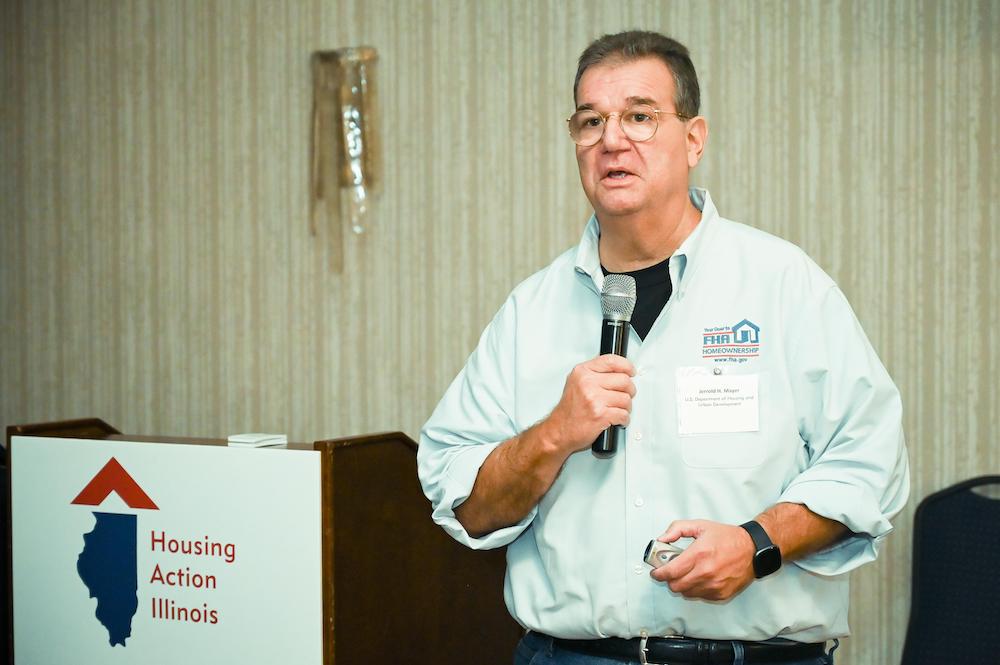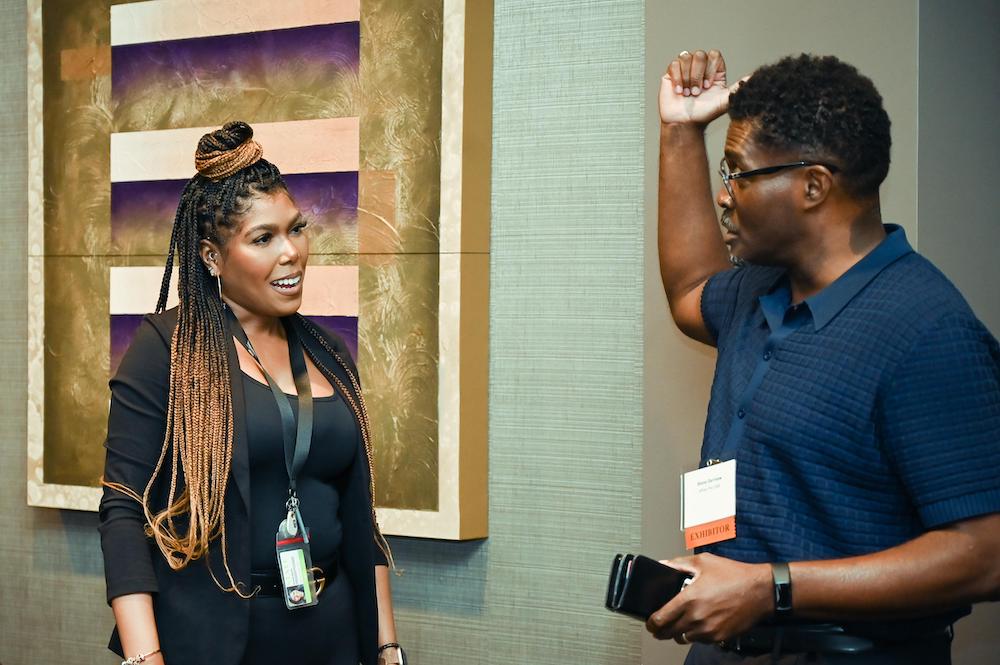Housing Matters 2023
October 19 & 20 | Bloomington, IL

Housing Matters
October 19 & 20 | Bloomington, IL
2023 Conference Program
This year, we were excited to sell out early and gather nearly 350 participants in Bloomington, IL! Attendees joined us to dig into the issues, hear from experts, and build relationships on October 19 & 20. During the conference, we kicked off with opening keynote speaker Marisol Bello and ended on a highnote with closing keynote speaker Dr. Andre M. Perry. In addition to our general sessions, we facilitated 16 breakout workshops, hand printed tote bags with artist William Estrada, and held a reception with live jazz from The Reginald Lewis Quartet and a moment of recognition for those serving a year in our AmeriCorps network.
Thank you to all of the speakers, sponsors, supporters, and conference attendees that participated in 2023 Housing Matters and helped to make it a success.
Presentations
General Sessions
Opening Keynote with Marisol Bello | Story to Action: Moving People for Change
Stories have power. We know this is true because we hear everyday from the people we serve about how important a safe, quality, affordable home is to them. Imagine the power for change if everyone could hear these stories from trusted people and sources of information, such as social media, TV shows, or the news. A powerful new narrative about housing as a basic need that requires public investment—that’s how we build support for our cause, create solutions, and make positive change.
Membership Meeting
Download presentation slides »
During our annual membership meeting, we’ll share our recent successes and challenges, as well as goals for the coming year. All are welcome to join, whether or not your organization is a member.
Closing Keynote with Dr. Andre M. Perry | Know Your Price: How Valuing Black Property Shapes Our Communities
Download presentation slides »
Homeownership has traditionally been key to the American Dream, representing success, opportunity, and wealth—but homeownership is farther out of reach for some than others. The deliberate devaluation of Black property and communities has had very real, far-reaching, and negative economic and social effects for all of us. For much of the 20th century, segregation and racist federal housing policy through redlining made it difficult or impossible for Black people to purchase homes, build wealth, start and invest in businesses, and afford college tuition. Today, disparities continue. What is the cost of this racial bias for our communities? Hear from noted educator, journalist, and scholar Dr. Andre Perry, who co-authored the groundbreaking Brookings Institution report “The Devaluation of Assets in Black Neighborhoods”—which includes data on Illinois cities including Chicago, Decatur, Peoria, and more. Marisa Novara, Vice President of Community Impact at The Chicago Community Trust, will be joining us and Dr. Perry in conversation and moderating our audience Q&A.
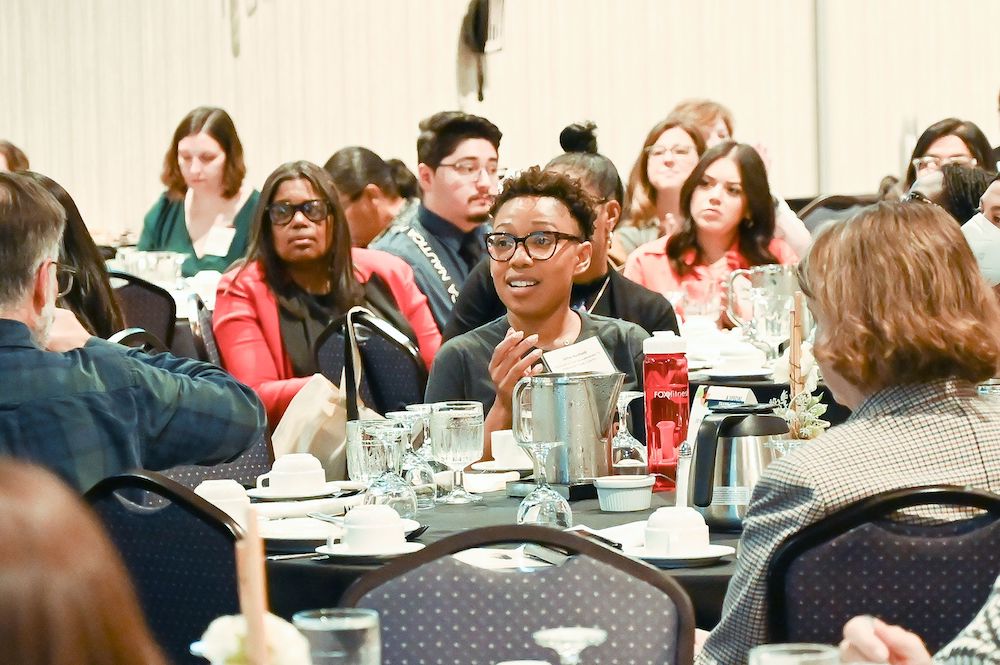
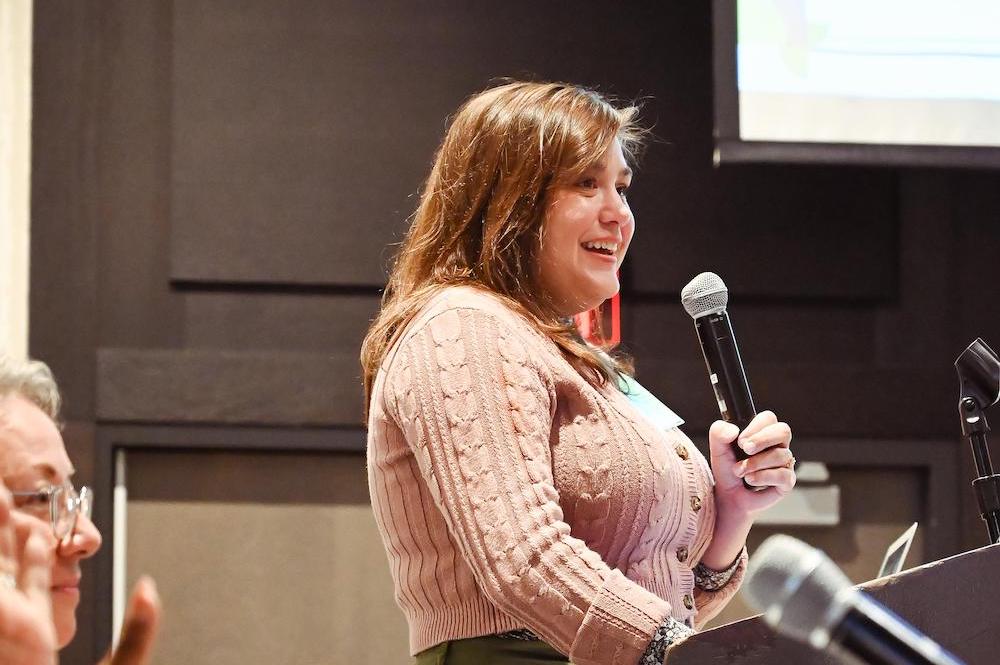
Ending Homelessness Breakout Sessions
Listening Session: Updating our State Plan to Prevent and End Homelessness
Speaker: Kylon Hooks, Illinois Office to Prevent and End Homelessness
Download presentation slides »
In July 2022, the State of Illinois’ first plan to prevent and end homelessness, Home Illinois, was released. The plan sets the foundational vision for achieving functional zero homelessness in Illinois. Home Illinois is a two-year plan that sunsets in June 2024, and work is underway to develop a new plan. Join us to hear an update from Christine Haley, the Chief Homelessness Officer for the State of Illinois, on the most innovative and important components of the plan currently being implemented. This meeting will also serve as a listening session for people to provide feedback on what parts of the existing plan are most crucial to build upon, as well as to to identify any additional priorities that should be addressed in the future.
Increasing Local Support for Emergency Shelters
Speakers: Betty Bogg, Connections for the Homeless; Dr. Dawn Broers, Fortitude Community Outreach; Bailee VanAntwerp, City of Champaign Township
Download presentation slides »
Securing local approval to locate an emergency shelter has always been a challenge. The COVID-19 pandemic refocused attention on this, as shelter providers often had to seek new sites to allow for social distancing. Now, many shelter providers are still working to secure and develop new sites for congregate and non-congregate fixed site shelter. Small groups of opponents often play an outsized role in campaigns to stop shelters. In this session, using current examples from around the state, shelter providers will talk about how community outreach and education, including with local government and elected officials, can change the narrative from NIMBY rhetoric to positive responses. We’ll also discuss strategies to continue getting everyday work done, move your project along, and respond to clients’ urgent needs when addressing opposition at the same time.
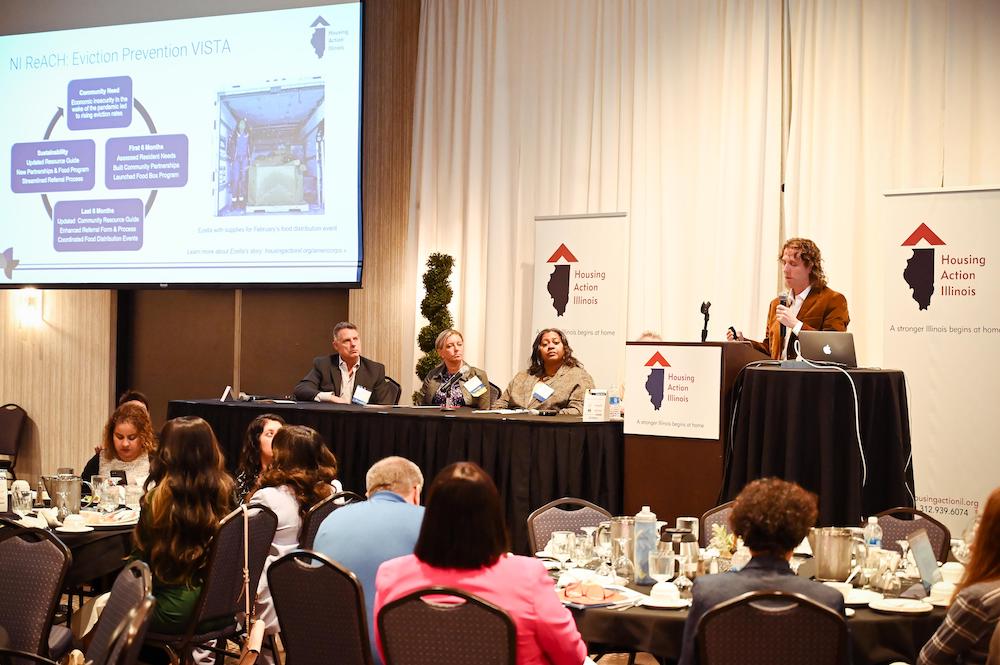
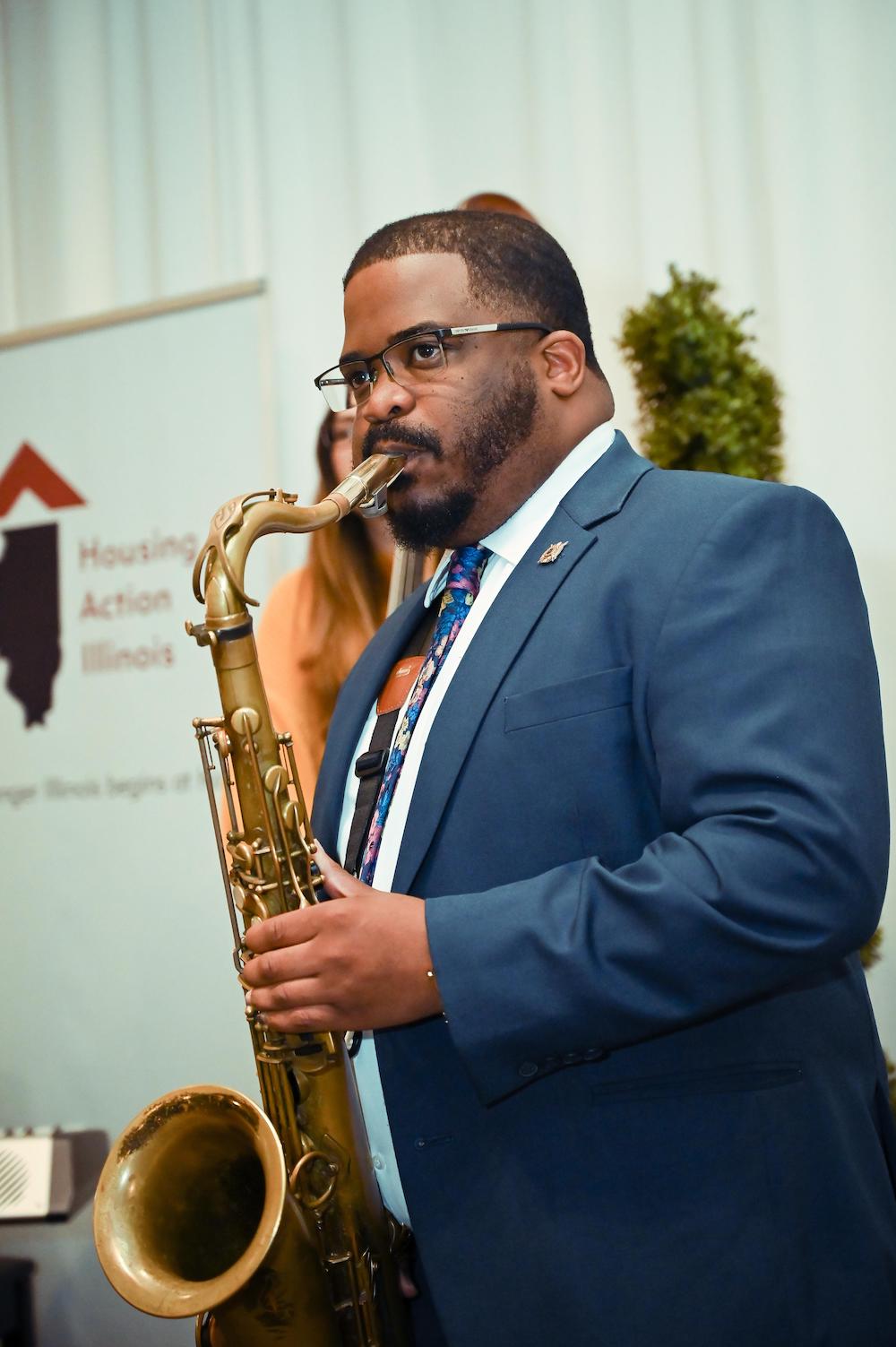
Policy Advocacy Breakout Sessions
Reasonable Accommodations: Supporting People With Disabilities
Speakers: Eric Brown, RAMP; Conan Calhoun, LIFE CIL; Andrés J. Gallegos, Hughes Socol Piers Resnick & Dym; Ken Walden, Access Living
Download presentation slides »
When is a housing provider required to provide reasonable accommodations for someone with a disability? What about a modification? How can you support an individual with a disability in advocating for themselves? What are assistance animals? Join us for a broad-ranging conversation answering these questions and more. We’ll cover the essentials of requesting reasonable accommodations and modifications for individuals who are applying for housing or who are existing tenants, then dig into related issues. You’ll hear from disability rights attorneys and staff members from Centers for Independent Living, which provide support for people with disabilities so they may achieve independence in every aspect of their lives, including home, work and school. Come ready for an interactive discussion.
Eviction Prevention in Supportive Housing Programs
Speakers: Jake Bradley, Alliance to End Homelessness in Suburban Cook County; Vince Heneghan, Impact Behavioral Health Partners
Download presentation slides »
Download presentation worksheet »
Download presentation resources »
Learn how to develop and implement a robust, comprehensive effective eviction prevention program that focuses on assisting supportive housing tenants. We will discuss how to help clients get their needs met while altering behaviors that put their housing stability at risk. We will focus on using methods such as motivational interviewing, trauma-Informed care, a Housing First approach, harm reduction, person-centered collaboration, creativity, and a solutions-focused mindset to prevent evictions. Together, we will examine real world Housing First scenarios and challenges, explore different approaches to preserve housing, and talk through practical ideas and solutions.
Eviction Mediation Programs: Benefits & Lessons
Speakers: Rosa Druker, Dispute Resolution Institute; Chris Riehlmann, Resolution Systems Institute
Download presentation slides »
Download presentation resources »
Join us to hear about eviction mediation programs run by Dispute Resolution Institute and Resolution Systems Institute, two organizations funded by the Illinois Equal Justice Foundation. The first half of the session will be informational, and you’ll learn about the mediation process and how the programs function, as well as hear insights staff have gained in the past two years and our thoughts on the future of eviction mediation in Illinois. The second half will consist of a live role-play session, during which participants will observe a mock eviction mediation session, facilitated by a professional mediator. Afterwards, we will answer questions and reflect on the process.
Public Policy to Meet Reentry Housing Needs
Speakers: Ashley Bishel, Uptown People’s Law Center; Jilly Graciana, NiReach; Terrence Chism & Laurie Jo Reynolds, Chicago 400 Alliance
Download presentation slides »
This session will explore examples of local, state and federal public policies that have changed for the better to create more housing opportunities for justice-involved individuals. Examples include Cook County’s Just Housing Amendment, the Illinois Human Rights Act’s protections against denying housing based on arrest records, and a recently amended state law to promote access to public housing. We’ll discuss the implementation challenges and unmet needs in ensuring housing access for people with criminal records. Key areas for additional public policy change will be discussed, such as reforming housing banishment laws that force people on public conviction registries into homelessness, poverty, and back into prison.
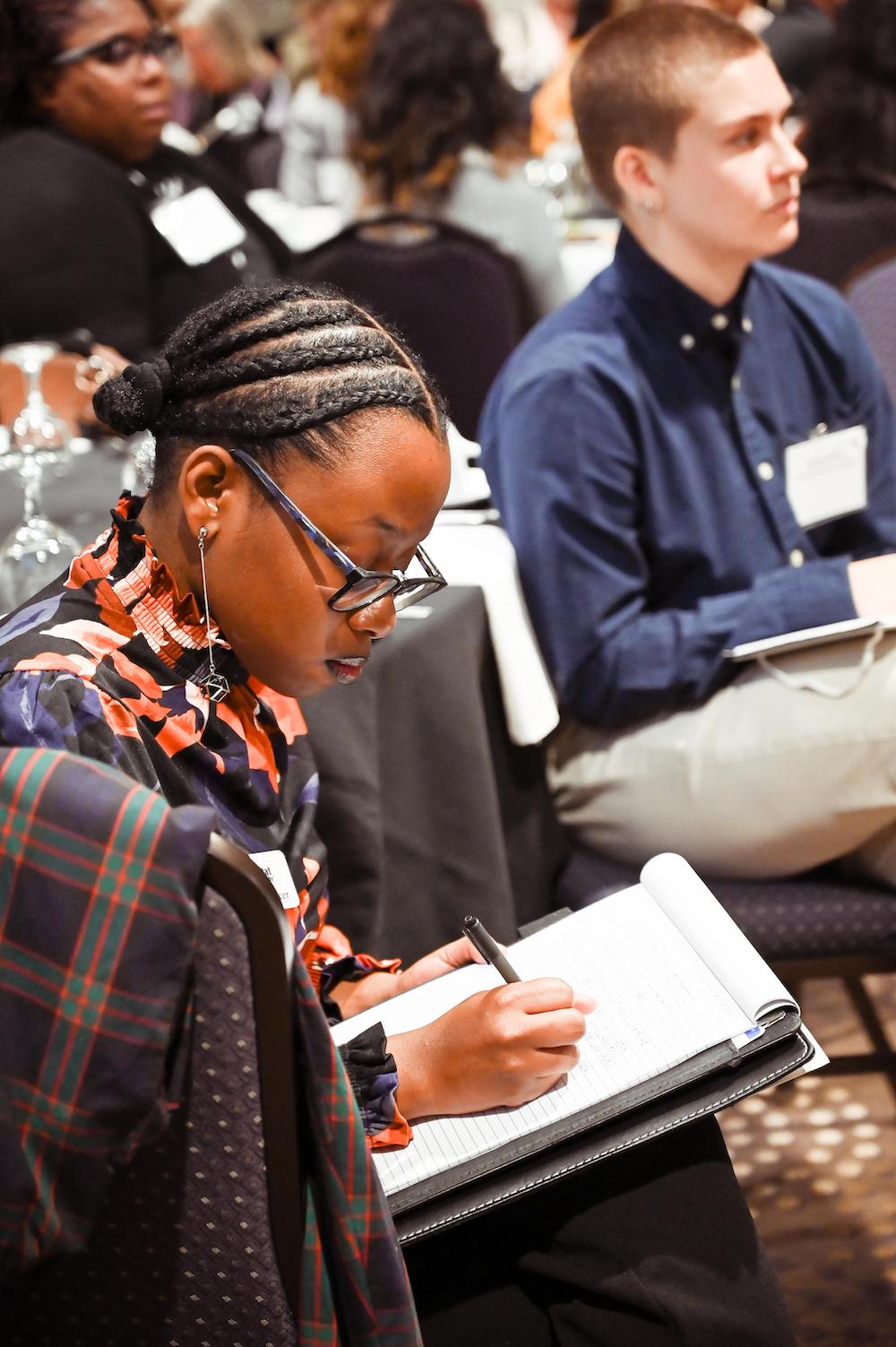
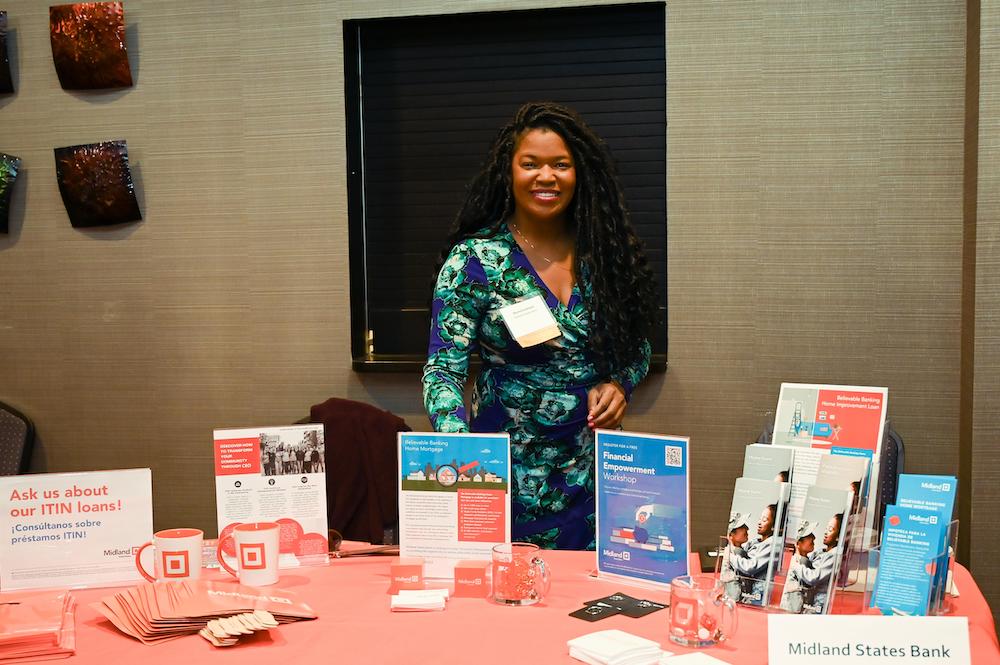
Housing Counseling Breakout Sessions
Updates from the Office of Housing Counseling
Speaker: Jerrold Mayer, HUD
Download presentation slides »
Jerrold H. Mayer from HUD’s Office of Housing Counseling will join us to give an update on HUD programs, new initiatives, the latest revision to the HUD Handbook 7601, new marketing materials for counseling agencies, and National Industry Standards. He will also discuss upcoming opportunities and challenges facing housing counselors in our industry. The session will allow plenty of time for Q&A; this is a unique opportunity for housing counseling staff to ask questions and meet Jerrold Mayer.
Smooth Staff Transitions for Housing Counseling Agencies
Speakers: Cora Fulmore, Diversified Resource Network
Download presentation slides »
Download processes & procedures slides »
Confidentiality plays a vital role in the non-profit sector, especially in housing counseling. Organizations must establish protocols to protect client information and maintain trust. Staff turnover can potentially jeopardize this confidentiality, so having strong onboarding and off-boarding processes is essential. Join us to discuss how to offset the loss of staff members, lost experience, and knowledge; overseeing the transition without interruptions; policies for protecting your agency’s continuity; ways to motivate departing staff to cooperate; and building the new team member’s skill sets. By planning for these aspects of transition, nonprofit organizations can minimize the negative impact of staff turnover. This will help maintain trust and professionalism and ultimately contribute to your organization’s continued success in fulfilling its mission.
Housing Counseling Agency Health Check-In: Maintaining a Happy Staff
Speaker: Maria Campos, CuraLinc Healthcare
Download presentation slides »
Download presentation resources »
For years, housing counseling agencies have been in emergency mode, responding to the pandemic and changing client needs, harming our front-line intake, counselors, and management teams. Join us to discuss healthy boundaries that address our clients’ mental and housing needs. We’ll share best practices starting with a housing counseling agency check-in with advice for triage, pipeline management, and free resources to combat burnout and increase staff happiness.
Special Purpose Credit Programs
Speakers: Don Nash, Homeownership Council of America; Chris Rothwell, FHLBank Chicago
Download presentation slides »
Special-purpose credit programs set out unique standards and benefits to make loan qualification easier for people who are from underserved populations. Could a special-purpose benefit your pre-purchase clients? Join the Homeownership Council of America’s Don Nash and Federal Home Loan Bank of Chicago’s Chris Rothwell to discuss the origin of special-purpose credit programs, how these programs are different from other financing vehicles, and how they could help more people to purchase a home.
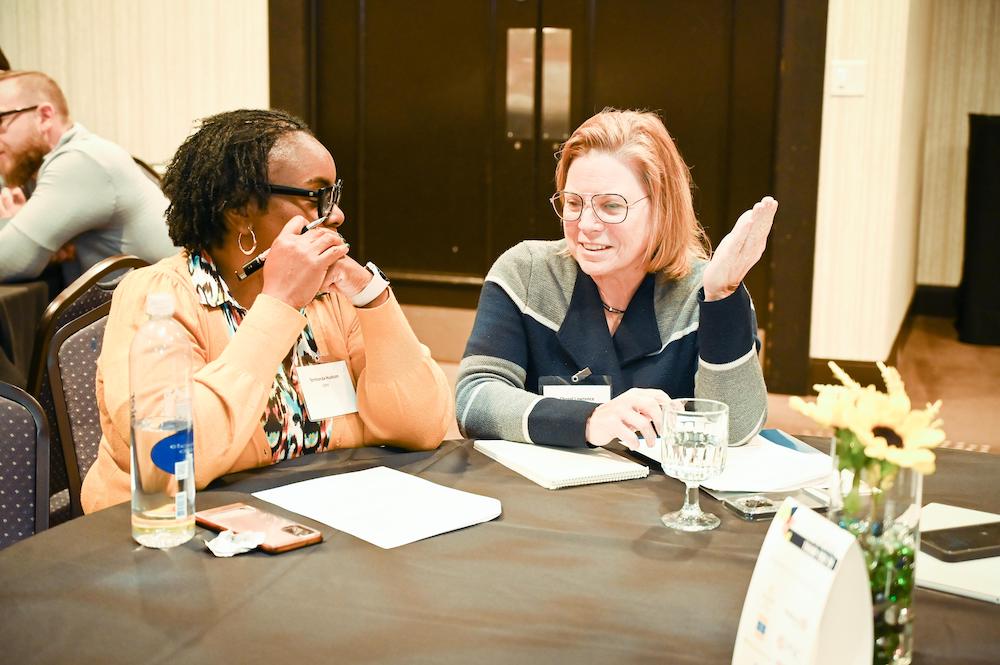
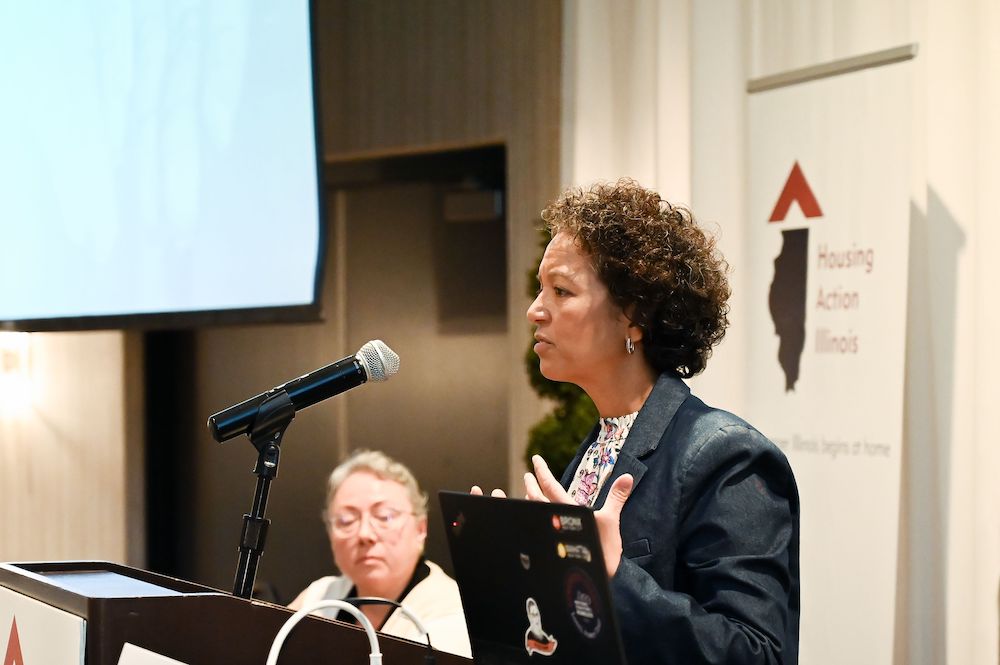
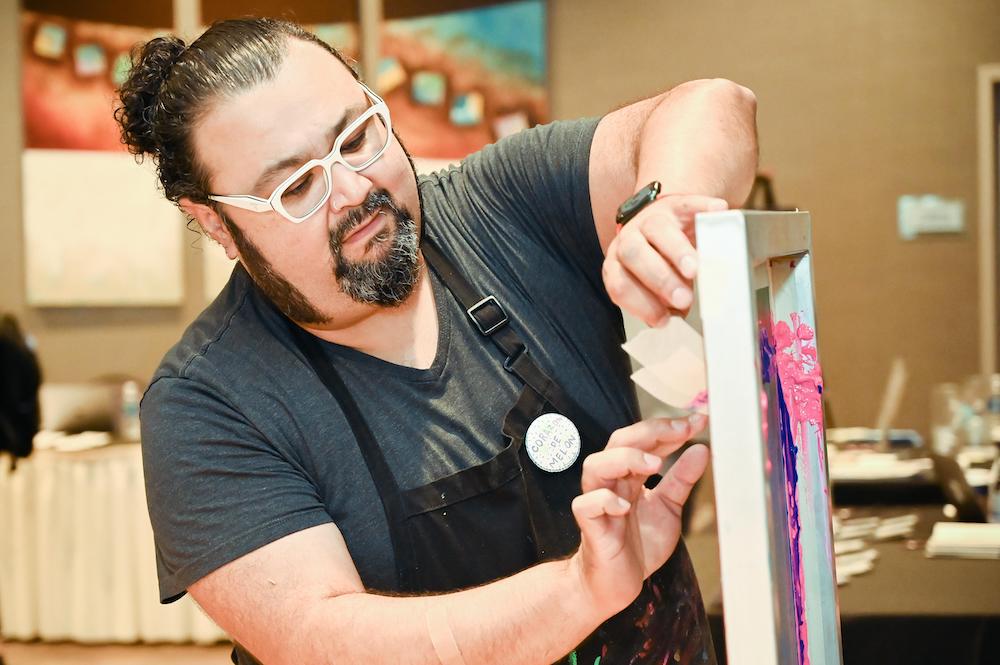
Affordable Housing Development Breakout Sessions
Community Engagement & Equitable Zoning
Speakers: Sue Loellbach, Connections for the Homeless; Ben LeRoy, University of Illinois Urbana-Champaign
Download presentation slides »
Zoning impacts so many areas of our lives in invisible but significant ways. Learn about a project that analyzed the impact of zoning on those most in need of affordable housing and sought input from those very people on the topic. Whether it’s density or parking, building height or “preserving community character,” the opinions of minorities, people with disabilities, and people with lived experience of homelessness often aren’t heard. This session will describe a range of approaches to community outreach and engagement as they relate to equitable zoning. You will have a chance to role-play real-world decision-making processes that municipalities go through on a regular basis to address the concerns of people across social, economic, and political experiences.
Understanding Tax Credits for Affordable Housing Development
Speakers: Jolyn Heun and C.C. Huang, Applegate & Thorne-Thomsen
Download presentation slides »
Learn the basics of the federal Low Income Housing Tax Credit and Illinois tax credits, which are a critical tool used to develop affordable housing. New to tax credits? Attorneys Jolyn Huehn and C. C. Huang of Applegate & Thorne-Thomsen will cover the fundamentals, explaining what a tax credit is, how tax credits are allocated, and how you can use them as a tool to finance affordable housing.
Uplifting Communities with Infill Housing
Speakers: Dena Bell, IFF; Jane Genzel, Peoria Opportunities Foundation; Michelle Sablak and Todd Wiltse, WJW Architects
Download presentation slides »
Join a panel discussion among non-profit developers and architects with recent experience in uplifting communities through infill scattered site affordable housing development. We will discuss multiple recently-completed case study projects and identify challenges as well as with associated solutions, ranging from land acquisition and entitlements to coping with aging public infrastructure and other site-specific and contextual hurdles. Hear about design best practices, strategies for realizing efficiencies, and the transformative potential of infill scattered site projects for communities.
Strength in Numbers: Leveraging Data to Build Up Community Developers
Speakers: Armeca Crawford, Peoria Housing Authority; Kimberly Danna, U.S. Department of Housing and Urban Development; Frank Woodruff, NACEDA
Download presentation slides »
Join us for a roundtable discussing how data from NACEDA’s Grounding Values Study can drive positive change in Illinois communities. Learn how the study identifies key financial trends for strong and sustainable community-based development organizations in Illinois. Our panel of experts will explore how community development activities reflect the unique needs of rural, urban, and mixed communities, the ways funding streams shape community-based development operations, and practical strategies for incorporating study findings into community development initiatives—such as policy advocacy, grassroots organizing, and capacity building.
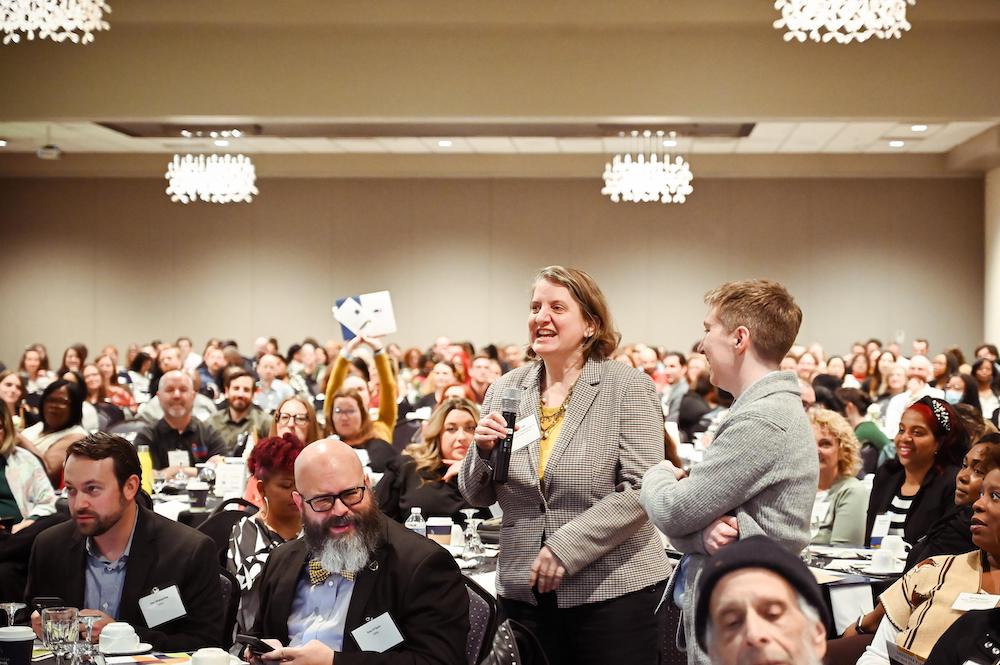
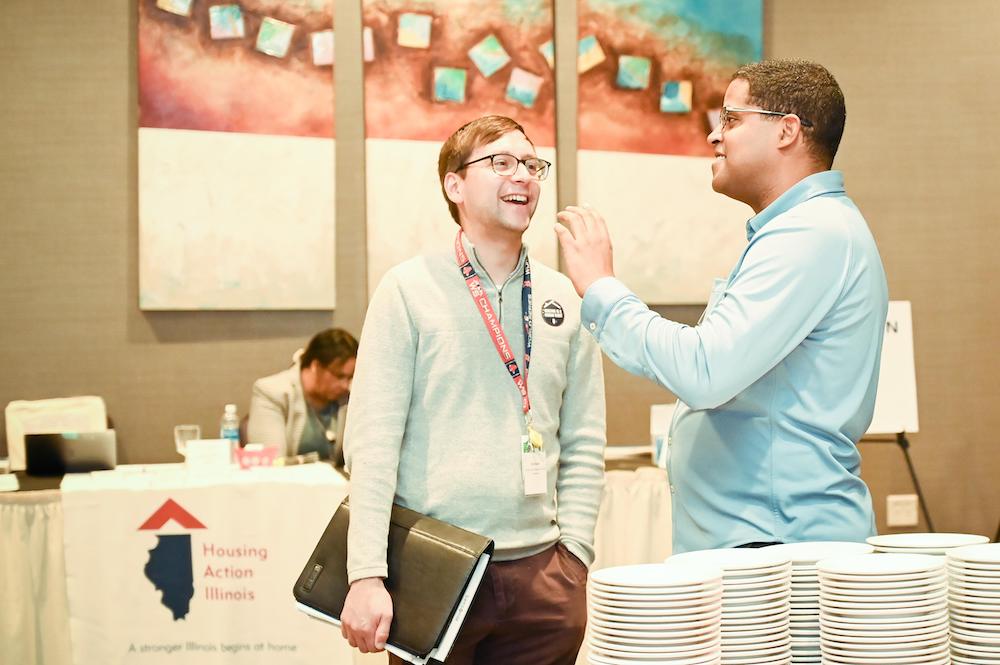
Cross-Topic & Wild Card Breakout Session
Grant Prospecting & Beyond
Speaker: Suzy Lee, Forefront
Download presentation slides »
Join us for a discussion on how to diversify your organization’s resources. We’ll talk about both traditional grant prospecting with foundations as well as going outside the box to bring in more alternative sources of funding. Start expanding what you think of as possible for your organization’s revenue. We’ll share tips and go over concrete examples from a variety of nonprofits. Participants will come away equipped with at least three ideas for new funding opportunities.
Simplifying the Message: Designing Inclusive Communications
Speakers: Melanie Sampson, Clear Language Lab at Literacy Works
Download presentation slides »
Download presentation resources »
Join us as we dive into the power of plain language. In this session, we will explore strategies and techniques to create materials that are accessible, inclusive, and easily understood by all.We will focus on designing better materials, including forms, brochures, event flyers, and online registrations. We will discuss the principles of plain language, examine its benefits, and explore real-world examples that illustrate the transformative potential of clear and concise communication. You will learn practical techniques to simplify complex concepts, eliminate jargon, and craft messages that resonate with diverse audiences.
